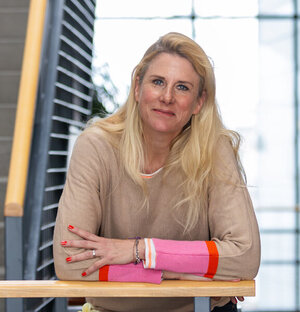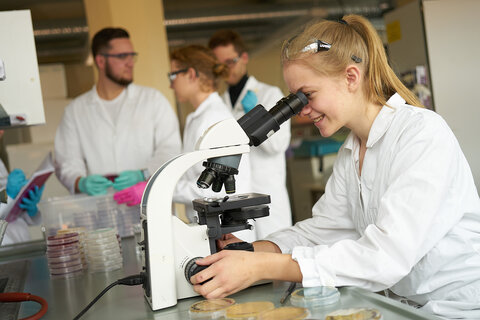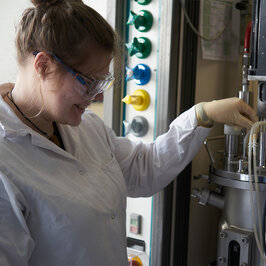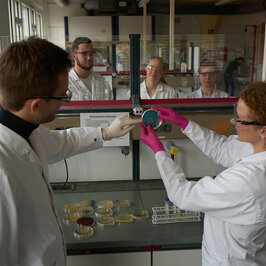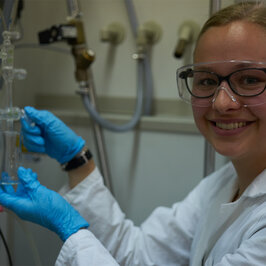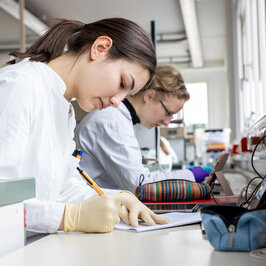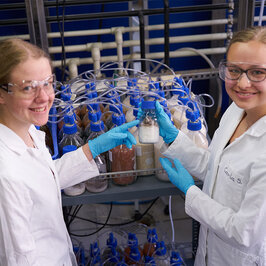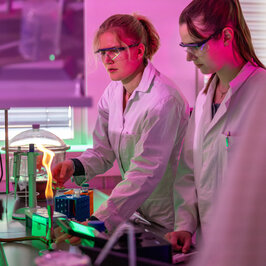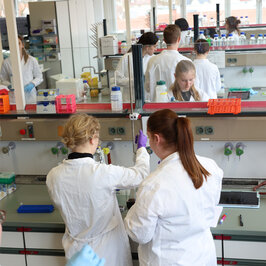Programme content and structure
Programme content and structure
We provide you with interdisciplinary training in the technical, industrial and pharmaceutical applications of this knowl-how based on the life sciences. Together we work on questions such as, "Can enzymes help break down plastic waste?" or "How can biotechnology be used to produce food and medicines in a more resource-efficient way?"
Get your career off to a flying start with this broad specialist knowledge.
Entry requirements
More is more
We recommend our Applied Biology course to anyone who is interested in biology in all its various areas of application. Microbiology, cell and molecular biology, biomedicine and biotechnology are extremely relevant for the future, and we would love to get you even more excited about them.
In contrast to a generalist degree in biology at a university, we teach focused biological and technical courses that are important for industrial applications - for example in the fields of biochemistry or process engineering. At ANB, you combine the content of a biology degree programme with the content of a biotechnology degree programme.
So ANB is interdisciplinary. By learning about the different application areas of biology and biotechnology, you'll develop a high level of problem-solving skills. And this specialist knowledge opens up a wide range of career opportunities for you!
What's covered
Semester fees
Special features
International experience as a career plus
International experience is particularly advantageous in the research-oriented life sciences. At HFU there are many opportunities to spend part of your studies abroad. We maintain partnerships with universities all over the world. You can also easily complete your practical semester or thesis at a company or institute abroad. The best time to spend six to twelve months abroad is generally after completing your foundation studies, preferably in the 6th semester. In any case, the study abroad period should be planned well ahead of time. We will be happy to advise you on this decision!
Key contact person for the semester abroad: Prof. Dr. Ulrike Fasol, Phone +49 7720 307-4754, Email application is started:ulrike.fasol(at)hs-furtwangen.de
Key contact person for the internship semester: Prof. Dr. Simon Hellstern, Phone +49 7720 307-4382, Email application is started:simon.hellstern(at)hs-furtwangen.de
Cutting-edge labs - equipped for every eventuality
HFU has a large number of very well-equipped laboratories that enable optimal interdisciplinary teaching and research. For your basic scientific training on the Applied Biology degree programme, you'll be working in the labs for chemistry, measurement technology and analytics. Internships in biological subjects such as microbiology, molecular biology and biochemistry take place in our own labs. As a rule, two students form a practical team, which is supervised by two lecturers for a total group size of approx. 20 students.
In special laboratories such as cell culture technology or the technical center you get the opportunity to work with state-of-the-art equipment integrated into current research projects during your bachelor's degree.
One very special lab is our in-house distillery, which of course focuses on beverages and we often find out together – biotechnology can be pretty tasty!
Your career prospects
The sky's the limit
Applied biology and biotechnology play an increasingly important role in the economy, opening up new fields of activity for qualified graduates. There's an urgent need for their specialist know-how in the pharmaceutical and food industries, in biomedical and biotechnical research and in environmental protection, for example.
The specialisations in Pharmaceutical and Industrial Biotechnology and Applied Environmental Protection give you just what potential employers in these areas need.
The Synthetic Biology elective is another specialist area that already plays an important role in drug production and biomedicine and will continue to grow in the future. The legal, business and management-related knowledge acquired during your studies will of course also contribute to your excellent career prospects after graduation.
Possible fields of work for our graduates include: Industrial research and development, production, quality management, product management, marketing, sales, safety management, metrology and analytics, clinical/chemical diagnostics, applied environmental protection and environmental engineering.
After graduating with a Bachelor of Science in Applied Biology, you can also continue your academic career: You will have the perfect foundation for a subsequent master's degree in Biological Sciences or a related subject. At HFU, we offer you many opportunities - right up to a doctorate!
FAQ
What prior knowledge is required for the Applied Biology programme?
No specific prior knowledge is required, but you should have an interest in the natural sciences (biology, chemistry, physics, and mathematics).
How much of the programme is devoted to mathematics, natural sciences and technical subjects?
In the first two semesters (the foundation study period), the proportion of chemistry, mathematics, physics and technology is relatively high at around 50 percent. These fundamentals are essential for studying in the natural sciences and technology. In the advanced study period, these fundamentals are then deepened in an application-oriented manner.
I had relatively little mathematics/physics/chemistry at school. How would you assess my chances in the relevant subjects?
It is not possible to make a blanket statement. Success in these subjects depends heavily on personal commitment and your (prior) knowledge. If necessary, tutorials and exercises are offered in the relevant subjects. There is also the option of private tutoring. If you start your studies with us in the winter semester, we often offer so-called “bridging courses” in mathematics and chemistry. These courses review school content. If you have not taken these subjects by the end of your school career, for example, or if you know that you still have deficits in these subjects, we recommend that you participate in the bridging courses. These are voluntary and free of charge. You will receive information about the bridging courses after you have received your letter of admission.
Is it possible to start studying in the summer and winter semesters?
Yes, you can start studying applied biology in both the summer and winter semesters.
Where can I find information about the application and admission process?
Internal link opens in the same window:Find out how to apply for ANB here.
Your key contacts
Interested, but still got questions? I'm happy to advise you!
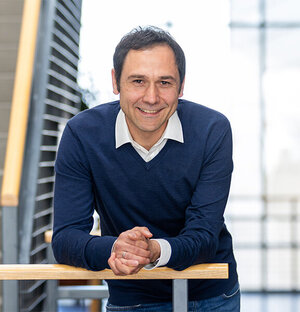
Applied Biology (BSc) (ANB)
Molecular and Technical Medicine (BSc) (MTZ)
Physician Assistant (BSc) (PA)
Precision Medicine Diagnostics (MSc) (PMD)
